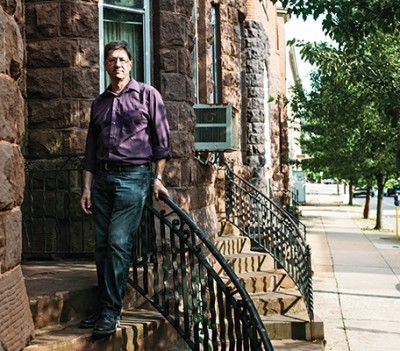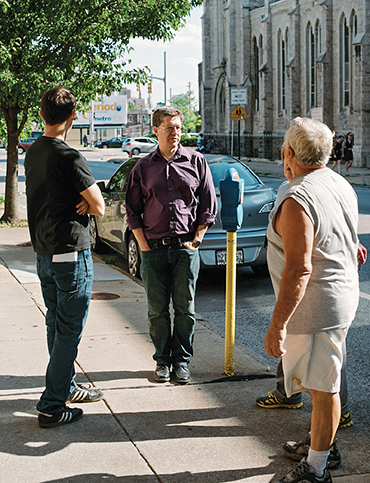
Photo: Jonathan Hanson
Professor Stephen Deets stands outside one of the two row houses he owns in the Charles North neighborhood of Baltimore.
Stephen Deets’ brother always dreamed of owning an old, Victorian row house. So after Michael finally bought an abandoned one in Baltimore’s Charles North neighborhood, Deets went to visit. Arriving early, he went for a walk and soon was struck by his surroundings. “Everything was boarded up,” says the associate professor of politics. “Everywhere you looked, the entire block was boarded up.” The neighborhood, such as it was, seemed devoid of life. Nobody was around.
But Charles North became Michael’s passion. He was always going to community meetings, always trying to better the neighborhood in some way. “He invested a lot of time, energy, and money restoring not only his house, but also the community,” Deets says. When Michael passed away from cancer in 2011, Deets inherited the row home and another one his brother bought on the same street. He also inherited his community contacts. Now, just like Michael, he has become heavily involved in Charles North. “I tell people that in the summer, Baltimore is my job,” Deets says.

Photo: Jonathan Hanson
Many at Babson would be surprised to learn that the professor’s life is so centered on Baltimore, and that he actually doesn’t live in the Boston area full time. Since 1995, he has called College Park, Md., home and splits his time between there and Babson during the school year. During the summer, he travels several times a week from College Park to Charles North in central Baltimore, located just north of Penn Station.
Growing up in Columbia, Md., Deets earned his undergraduate degree at Johns Hopkins University, mere blocks from Charles North. As a student, Deets hung out in the neighborhood, going to bars and clubs and seeing movies at the Charles Theater. This was the 1980s, and Charles North was in serious decline. “It was bad in the late ’80s,” Deets says. “It was terrible in the late ’90s.” In 1998, Michael bought his row house, which dates back to 1890 but was boarded up and covered in white paint that was peeling and faded. The rest of his block was unoccupied, and the few people who lived in the neighborhood were poor. Crime, thankfully, wasn’t much of a problem. “In order to have crime, there has to be things to steal,” Deets says.
Michael went about fixing up his house; four years passed before it was ready for him to move in. He also became involved with neighborhood organizations, including serving on the board of the Charles North Community Association. He attended one meeting after another, dealing with zoning, code enforcement, and seizing of problematic properties. “He was a believer in institutions, that institutions can build and change community,” Deets says.
When Michael died, Deets decided to keep both of his brother’s houses (Deets rents one and uses the other as a second home/guesthouse). He also continues his brother’s efforts in the neighborhood. Doing so allows him to honor Michael’s legacy, but the work also appeals to Deets. He gained access to his brother’s eclectic network: city officials, developers, entrepreneurs, artists, community leaders, business owners. For a professor of politics, this was a chance to experience politics at the ground level. “This is politics in spades,” Deets says. Like his brother, he’s involved with the Charles North Community Association. As chair of the residents committee, he addresses issues such as parking, sprucing up the streetscape, and creating a community garden.
Babson has benefited from Deets’ experiences. In the classroom, he discusses the urban issues that he encounters and how working with stakeholders and solving problems creatively are important when tackling social concerns. He also has brought on Babson students as community development summer interns. Last year, students consulted with small businesses, taught a two-week entrepreneurship course for sixth and seventh graders, organized community events, and manned a new computer lab in a city-owned building for the elderly. “I keep them busy,” Deets says.
Deirdre Malo ’12 served as an intern in 2012. Among other initiatives, she applied for grants to benefit the neighborhood, and she found resources and drove membership for the community garden. “I came away knowing that there truly is a way to connect with every person around you, whether through an organized community meeting, a planting in the community garden, or a hula-hoop jam in the park,” Malo says. “Every stakeholder, from a smallbusiness owner to a longtime resident, has valuable opinions and ideas on how the neighborhood can be improved.”
Thanks to the efforts of people like the Deets brothers, and thanks in large part to nearby Penn Station, which allows D.C. commuters looking for affordable housing to move to the neighborhood, Charles North is becoming a great place to live. Yes, problems remain, such as vacant lots, prostitution, and nearby methadone clinics, but the community has seen the renovation of many old buildings and an influx of new people. It has come a long way since the day Michael Deets bought his house. “When my brother got there, it was like pushing a big boulder up a hill,” Deets says. Now that boulder is over the top and rolling down the other side, picking up speed.—John Crawford
